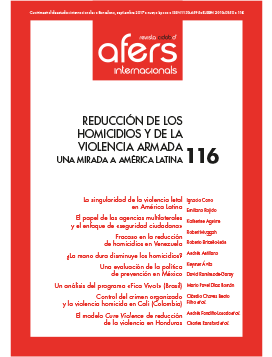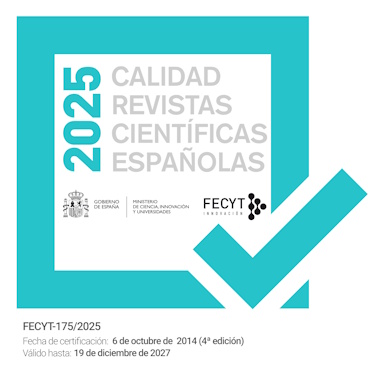What does the failure to reduce homicides in Venezuela teach?
Keywords:
homicidios, violencia, pobreza, institucionalidad, VenezuelaAbstract
Revista CIDOB d’Afers Internacionals, nº 116
Quadrimestral (May-September 2017)
ISSN:1133-6595 | E-ISSN:2013-035X
DOI: https://doi.org/10.24241/rcai.2017.116.2.53
This article addresses the paradox of increased homicides in Venezuela in a period of wealth and redistribution. To do so, theories that explain criminality through poverty and inequality are reviewed and refuted and weighed against theories of institutionalism. Thus, the article analyses the situation of homicides between 1985 and 2010 and establishes three periods in which the rules regulating access to a) goods, b) political power, and c) social and penal control were broken. The theories are discussed with statistical information and interpreted within the economic and political context of the time. It is concluded that the reduction in homicides requires institutionalism based on sensitivity and certain formal and informal rules that allow the construction of legitimacy around social difference and punishment, and a citizens’ culture that favours social control by peers over penal control by the State.
>> The full text articles of this issue are available only in Spanish language
References
Althusser, Louis. «Idéologie et Appareils idéologiques d´État. (Notes pour une recherche)», en: Althusser, Louis. Positions. París: Les Editions Sociales, 1976, p. 67-125.
Becker, Gary. «Crime and punishment: An economic approach». Journal of Political Economy, vol. 76, n.º 2 (1968), p. 169-217.
Bourdieu, Pierre y Passeron, Jean Claude. La Reproduction, éléments pour une théorie du système d´enseignement. París: Les Editions de Minuit, 1970. Briceño-León, Roberto. «Contabilidad de la Muerte», en: Cuando la muerte tomó las calles. Caracas: Ateneo de Caracas, 1990.
Briceño-León, Roberto; Camardiel, Alberto y Ávila, Olga. «La impunidad como causa de la violencia homicida», en: Briceño-León, Roberto; Ávila, Olga y Camardiel, Alberto. Violencia e Institucionalidad. Informe del Observatorio Venezolano de Violencia 2012. Caracas: Editorial Alfa, 2012, p. 129-147.
Cano, Ignacio y Santos, Nilton. Violência letal, renda e desigualdade social no Brasil. Río de Janeiro: 7 Letras, 2001. Capriles, Ruth. Leadership by Resentment. From Ressentiment to redemption. Londres: Edward Elgar, 2012.
Carrera Damas, Germán. Colombia, 1821-1827: aprender a edificar una república moderna liberal. Caracas: Fondo Editorial de Humanidades y Educación Universidad Cental de Venezuela, 2010.
CEPAL-Comision Económica para América Latina y el Caribe. Balance preliminar de las economías de America Latina y el Caribe 2011. División de Desarrollo Económico de la CEPAL. Santiago de Chile: CEPAL, 2012.
Consejo General de Policía y UNES-Universidad Nacional Experimental de la Seguridad. Gran Misión ¡A Toda Vida Venezuela! Caracas: UNES, 2012.
Cusson, Maurice. Criminologie Actuelle. París : Press Universitaires de France, 1998.
Deas, Malcolm. Del poder y la gramática. Bogotá: Taurus, 2006.
Deas, Malcolm y Gaitán Daza, Fernando. Dos ensayos especulativos sobre la violencia en Colombia. Bogotá: FONADE, DNP, Tercer mundo editores, 1995.
Durkheim, Émile. Sociologie et philosophie. París: Quadrige, Press Universitaires de France, 1996 [1924].
Elias, Norbert. El Proceso de la Civilización, Investigaciones Sociogenéticas y Psicogenéticas. México: Fondo de Cultura Económica, 1987.
Fajnzylber, Pablo; Lederman, Daniel y Loayza, Norman. «Inequality and violent crime». Journal of Law and Economics , vol. 45, n.º 1 (2002), p. 1-39.
Ferrajoli, Luigi. Democracia y garantismo. Madrid: Trotta, 2008.
Freud, Sigmund. «Tótem y Tabú», en: Freud, Sigmund. Obras Completas [vol.ii]. Madrid: Biblioteca Nueva, 1973, p. 1.745-1.850.
Giddens, Anthony. The Constitution of Society. Cambridge: Polity Press, 1984.
Kaufmann, Daniel; Kraay, Aart y Mastruzzi, Massimo. Worldwide Governance indicators 2011. Washington, D.C.: World Bank Group, 2012.
Kruijt, Dirk. «Violencia y pobreza en América Latina: Los actores armados». Pensamiento Iberoamericano, n.º 2 (2008), p. 55-70.
LaFree, Gary. Losing Legitimacy: Street Crime and the decline of social institutions in America. Boulder, C.O.: Westview, 1998.
Lévi-Strauss, Claude. Antropología estructural. Buenos Aires: EUDEBA, 1969.
López Maya, Margarita. «Venezuela after the Caracazo. Forms of protest in a deinstitutionalized context». Bulletin of Latin America Research, vol. 21, n.º 2 (2002), p. 199-218. March, James G. y Olsen, Johan P. Rediscovering Institutions. Nueva York: Free Press, 1989.
March, James G. y Olsen, Johan. P. «Elaborating the “New Institutionalism”», en, Binder, Sarah; Rhodes, Roderick y Rockman, Bert (eds.). The Oxford Handbook of Political Institutions. Oxford: Oxford University Press, 2006, p. 3-22.
Marx, Karl. El Capital (Vol. ii). México: Fondo de Cultura Económica, 1968a.
Marx, Karl. Trabajo Asalariado y Capital. Madrid: Aguilera, 1968b.
Merton, Robert K. Teoría y estructura social. México: Fondo de Cultura Económica, 1965.
Messner, Steven F.; Rosenfeld, Richard y Karstedt, Susanne. «Social Institutions and Crime», en: Cullen, Francis y Wilcox, Pamela (eds.). Criminological Theory. Oxford: Oxford University Press, 2013, p. 405-423.
Moser, Caroline y Shrader, Elizabeth. Crimen, Violencia y Pobreza urbana en América Latina: Hacia un marco de referencia integrado. Wasghinton, D.C.: LCSES y Banco Mundial, 1998. Muggah, Robert y Alvarado, Nathalie. «Los Homicidios en América Latina: Seamos Ambiciosos». El País (29 de septiembre de 2016) (en línea) http://internacional. elpais.com/internacional/2016/09/29/america/1475159591_036416.html
North, Douglass. «Institutions». The Journal Economic Perspectives, vol. 5, n.º 1 (1991), p. 97-112.
North, Douglass C.; Wallis, John Joseph y Weingast, Barry R. Violence and Social Order. A conceptual Framework for interpreting Recorded Human History. Cambridge: Cambridge University Press, 2009.
Observatorio Venezolano de la Violencia. Informe nacional de la situación de violencia y criminalidad 2011. Caracas: OVV, 2011. Parsons, Talcott. «On the Concept of Political power», en: Bendix, Reinhard y Lipset, Seymour. Class, Status and Power. Londres: Routledge y Kegan Paul, 1966, p. 240-265.
Pécaut, Daniel. «Prefacio», en: Martin, Gerard. Medellín 1975-2012. Tragedia y Resurrección. Mafia, Ciudad y Estado. Bogotá: Planeta, 2012.
Pérez Perdomo, Rogelio y Friedman, Lawrence. «Legal Culture in the Age of Globalization», en: Friedman, Lawrence y Pérez Perdomo, Rogelio (eds.). Legal Culture in the Age of Globlalization. Latin América and Latin Europe. Standford: Standford University Press, 2003, p. 1-19.
Policía Nacional de Colombia. «Tablas estadísticas: delitos y contravenciones, 2011». Revista Criminalidad, vol. 54, n.º 1 (2012), p. 55-160.
Rawls, Anne W. «Social Order as Moral Order», en: Hitlin, Steven y Vaisey, Stephen (eds.). Handbook of the Sociology of Morality. Nueva York: Springer, 2013, p. 95-121.
República Bolivariana de Venezuela. Cumpliendo las Metas del Milenio 2010. Caracas: Imprenta Nacional, 2010.
Rosenfeld, Richard y Messner, Steven F. «The Normal Crime Rate, The Economy, and The Mass Incarceration», en: Barlow, Hugh D. y Decker, Scott H. (eds.). Criminology and Public Policy, Putting Theory to Work. Philadelphia: Temple University Press, 2010, p. 45-64.
Salazar, José Miguel. Bases Psicológicas de Nacionalismo. México: Trillas, 1983.
Sen, Amartya. The Idea of Justice. Cambridge: Harvard University Press, 2009.
Therborn, Göran. The Killing Fields of Inequality. Cambridge: Polity Press, 2013.
UNODC-United Nations Office on Drugs and Crime. Global Study on Homicide. Trends, Context, Data. Nueva York: UNODC, 2013.
Weber, Max. Economía y Sociedad. México: Fondo de Cultura Económica, 1964 [1922].
World Bank. World Development Report 2011: Conflict , Security and Development. Washington, D.C.: World Bank, 2011.













